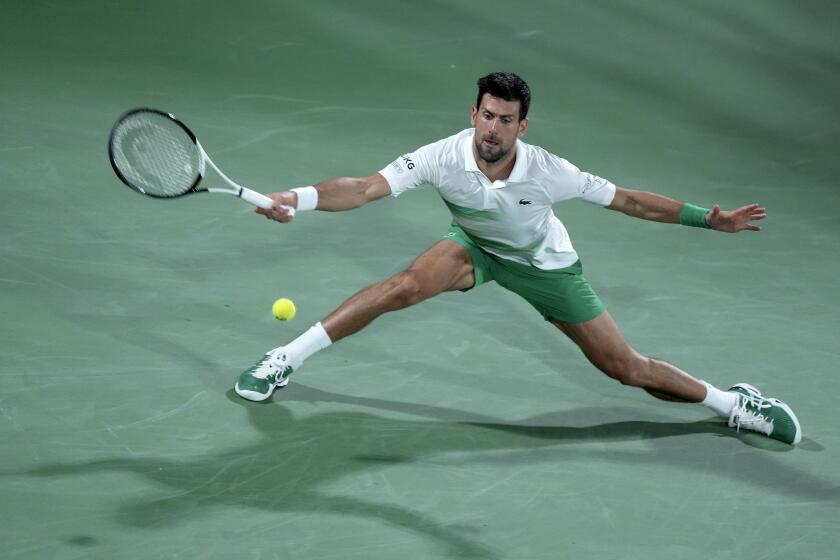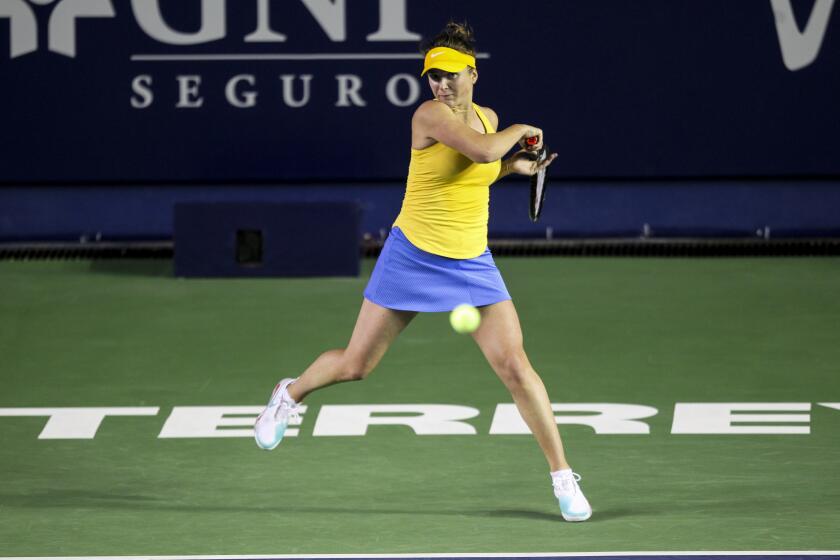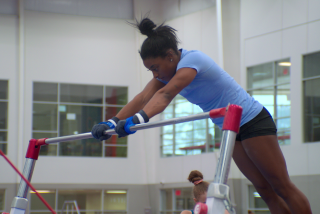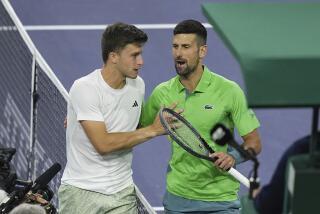Naomi Osaka brings renewed confidence to Indian Wells: ‘I’m at peace with myself.’
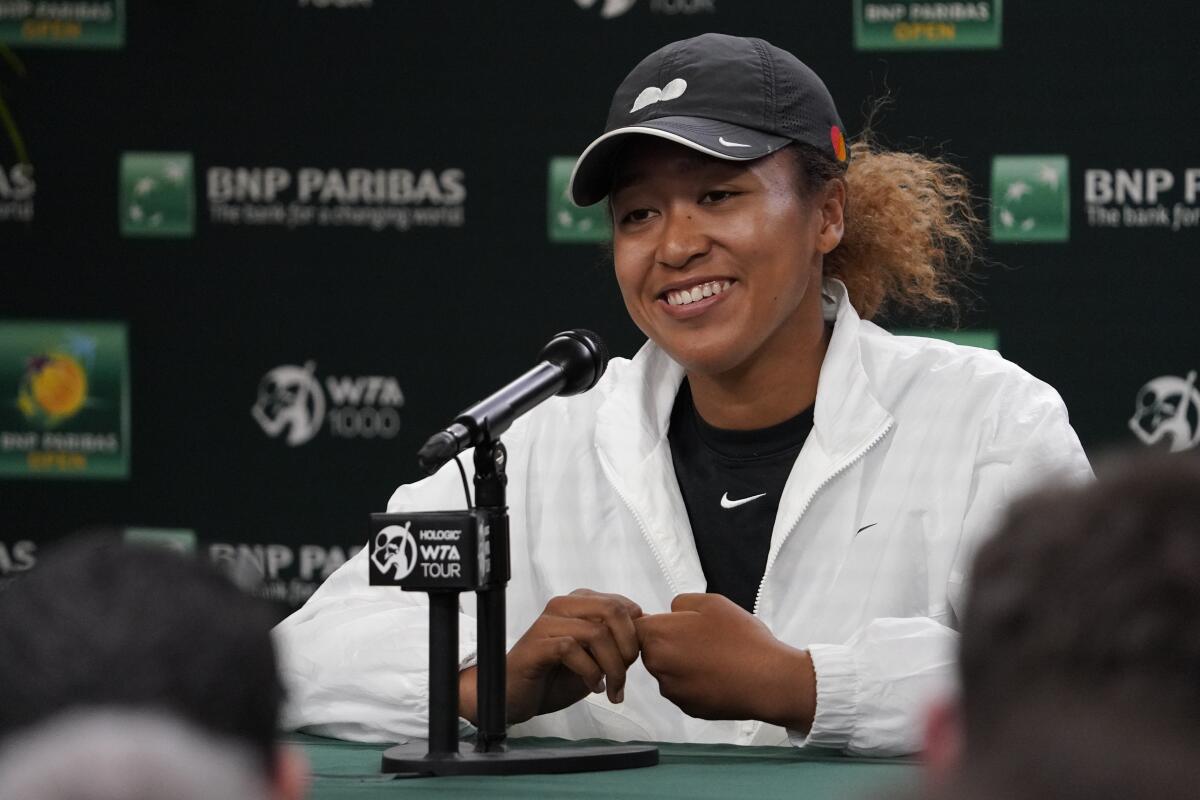
- Share via
INDIAN WELLS — Everything felt so familiar yet so strange when Naomi Osaka made her way around the grounds of the Indian Wells Tennis Garden this week before the start of the BNP Paribas Open.
The desert scenery was as picturesque as ever, and the courts where she won the 2018 title and launched her ascent toward becoming a four-time Grand Slam singles champion and No. 1 women’s player in the world were as pristine as they’ve ever been. The closeness of fans to the practice courts was happily the same, too.
The change she felt was subtle but momentous to Osaka, who last year acknowledged she had been experiencing bouts of depression and anxiety. In speaking so frankly while announcing her withdrawal from the French Open, she made it OK for athletes to say they’re not OK, greatly reducing the stigma of discussing mental health issues. Gymnast Simone Biles continued the discussion when she withdrew from the Tokyo Olympics team event and several individual events, but it was Osaka — whose Japanese and Haitian heritage and American upbringing have made her a cross-cultural phenomenon — who elevated the conversation into the international spotlight.
Osaka, whose world ranking has dropped to 78 because she took time off and has played in only two tournaments this year, felt welcomed at Indian Wells with open arms and opened minds as she chatted with people who recognized she had become vulnerable and wanted, in even a small way, to help her feel safe here and everywhere.
“Usually when I walk around there’s people that are like, ‘Win the tournament,’ or ‘I have tickets to the finals, see you there,’ kind of thing,” Osaka said. “Actually, everyone was saying, ‘I hope you have fun.’ I know that’s not like the biggest difference, but it meant a lot to me. It felt more personal.”
Novak Djokovic said he won’t play in the BNP Paribas Open at Indian Wells after learning he won’t be able to enter the U.S. because he is not vaccinated against COVID.
Those words and wishes have taken root in her heart. Osaka, who began play Thursday with a wind-whipped 3-6, 6-1, 6-2 victory over 2017 U.S. Open champion Sloane Stephens, is in a better place than she has been for a while. If that translates into great success here, that’s fine. If not, she’s still only 24 and is finding her way toward balancing life and tennis in a new and healthier way.
Unlike men’s tennis, which has been dominated by Novak Djokovic, Rafael Nadal and Roger Federer for so long, women’s tennis has had many changes at the top and many new Grand Slam singles winners the past few years. There’s room for Osaka to rise again.
“I’m good. Honestly, I feel like I’m at peace with myself, which I think is a really good feeling to have as a person,” she said during a pre-tournament news conference Wednesday. “I’m really grateful.”
She needed a lot of time and reflection to reach this point. A self-described perfectionist, she said she rarely looks back at past results. Asked what she has done to regain her old triumphant form, she said she’s a different person now and can’t be who she once was.
“There’s always that doubt in my head like, ‘Will I ever be able to play like this, this, this,’ or whatever. But the players that I’m playing against are changing,” she said. “I feel like everyone’s improving. And I can’t necessarily say that I [regressed] as a player. I think there are things that I’ve gotten much better at, so I don’t know. I think life is a constant evolution.”
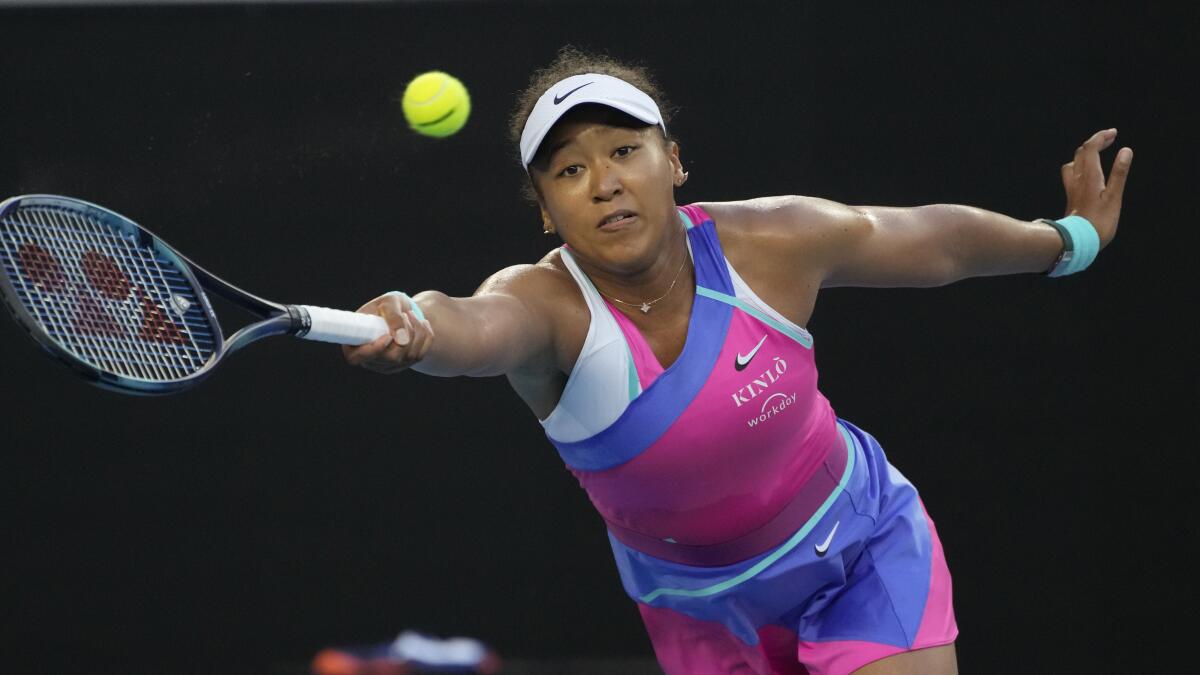
Osaka’s struggles last year undoubtedly were magnified by her need to keep it secret that she had been chosen for the high-profile task of lighting the cauldron for the pandemic-delayed Olympics in her native Japan. Her loss in the third round there hit her hard. “I guess I just thought I could do everything, if that makes sense. It wasn’t really rational but just to, like, play in my first Olympics and win it in Tokyo, I just thought that would be something I could achieve,” she said.
“I’m not saying it would have been easy, but I just think after winning the Grand Slams and stuff, I thought it was kind of an automatic thing so I think just losing there kind of reminded me that I was human. I’m not saying that I didn’t think I was human, but it was on hard court, so I thought that significantly boosted my chances. It was kind of needed.”
She took a break after her third-round U.S. Open loss to Canadian teenager Leylah Fernandez and didn’t play again until a warm-up event for the Australian Open in January. She withdrew from the semifinals because of an abdominal injury; she reached the third round of the Australian Open before losing to Amanda Anisimova in a third-set tiebreaker.
But with that defeat came a gain. “I actually left the court thinking, ‘You know what, I did my best and I had match points.’ I felt like that was pretty good,” she said.
Ukrainians and Russians will be competing at the BNP Paribas Open in Indian Wells this week, including Ukrainians Dayana Yastremska and Elina Svitolina.
She took a relatively short break after that because she was intent on preparing for this tournament and the next event, in Miami. Her work paid off Thursday, when she came back to win an intense second set against Stephens and fought off three break points in the third game of the third set to stop Stephens’ early momentum.
“I felt like I was fighting for my life,” Osaka said. “I was playing against her. I was playing against the wind. It was crazy.”
Osaka says she wants to focus on the clay season — clay is her weakest surface — but she’s content to build up steadily, at a comfortable pace with her newly comfortable mindset.
“This moment in my life with playing tennis is something I’ve trained for, for years and years,” Osaka said. “But then when I’m 70 or something it will probably be a small chapter for me. I have to enjoy it while I still can. Just having more appreciation for all the small … not small, it’s big in the moment, for every tournament that I play at.”
More to Read
Go beyond the scoreboard
Get the latest on L.A.'s teams in the daily Sports Report newsletter.
You may occasionally receive promotional content from the Los Angeles Times.

